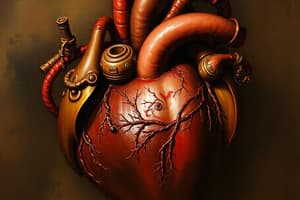Podcast
Questions and Answers
Which symptoms are most indicative of left heart failure associated with dilated cardiomyopathy?
Which symptoms are most indicative of left heart failure associated with dilated cardiomyopathy?
- Fatigue and abdominal fullness
- Crackles and pulmonary edema (correct)
- Angina and heart block
- Edema and ascites
What is a primary characteristic of restrictive cardiomyopathy?
What is a primary characteristic of restrictive cardiomyopathy?
- Scar tissue leading to refill problems (correct)
- Thickened heart muscle walls
- Excessive vascular dilation
- Increased cardiac output
In a patient with hypertrophic cardiomyopathy, what is a common recommendation to avoid exacerbating the condition?
In a patient with hypertrophic cardiomyopathy, what is a common recommendation to avoid exacerbating the condition?
- Participate in endurance sports
- Engage in rigorous weight lifting
- Increase protein intake
- Avoid sudden changes in position (correct)
Which treatment option is considered first-line for managing symptoms of heart failure?
Which treatment option is considered first-line for managing symptoms of heart failure?
Which medication should be avoided in patients with hypertrophic cardiomyopathy due to the risk of worsening obstruction?
Which medication should be avoided in patients with hypertrophic cardiomyopathy due to the risk of worsening obstruction?
Flashcards are hidden until you start studying
Study Notes
Cardiac Valve Locations
- Aortic valve is located in the second intercostal space (ICS) to the right of the sternum.
- Pulmonic valve is located in the second ICS to the left of the sternum.
- Tricuspid valve is located in the fourth ICS to the left of the sternum.
- Mitral valve is located in the fifth ICS to the left of the mid-clavicular line.
Cardiomyopathy:
- Dilated cardiomyopathy is characterized by enlarged heart chambers and weakened heart muscle.
- Symptoms include restlessness, agitation, shortness of breath (SOB), fatigue, angina, and heart block.
- This leads to heart failure: the heart struggles to pump blood effectively.
- The left ventricle issues cause lung symptoms like crackles and pulmonary edema.
- The right ventricle issues cause bodily symptoms like edema, ascites, and jugular venous distention (JVD).
- Regurgitation through tricuspid or bicuspid valves is a characteristic, resulting in a narrow pulse pressure due to decreased cardiac output.
Restrictive Cardiomyopathy:
- This condition involves stiff heart muscles that cannot stretch properly.
- Scar tissue formation hinders proper filling of the heart.
- Reduced blood intake leads to reduced blood output, resulting in symptoms like decreased oxygenation, fatigue, and SOB.
Heart Failure Causes:
- Amyloidosis: protein deposits within the heart.
- Sarcoidosis: inflammatory cell deposits in the heart.
- Hemochromatosis: iron deposits build-up in the heart.
- Radiation therapy or chemotherapy side effects.
Genetic/Hypertrophic Cardiomyopathy and Sudden Death:
- Often due to genetic factors.
- Characterized by thick heart muscle walls, especially the septum.
- This reduces blood flow in and out of the heart.
- The septum may obstruct the aortic valve.
Genetic Cardiomyopathy:
- Symptoms may be absent until strenuous activity is undertaken.
- Common symptoms include decreased oxygenation, SOB, fatigue, weakness, syncope, altered level of consciousness (ALOC), and chest pain.
Treatment and Management:
- Treat the underlying cause.
- First-line treatment involves medications like beta-blockers, calcium channel blockers (CCB), digoxin, antidysrhythmic agents, diuretics, and vasodilators.
- Heart transplant can be an option in severe cases.
- Diagnosis is often achieved using medical history and findings from physical examination, EKG, and echocardiogram.
Treatment of Hypertrophic Cardiomyopathy:
- Medications include beta-blockers and CCBs like Verapamil, which help slow down the heart rate.
- Surgical myectomy: a procedure to widen the septum.
- Alcohol ablation: procedure to remodel the septum.
Avoiding Triggers:
- Avoid weight lifting and activities that require straining, such as bowel movements.
- Avoid sudden bursts of energy or rapid position changes.
Medications to Avoid:
- Nitrates, digoxin, and diuretics can worsen obstruction, and should be avoided.
Additional Information:
- Treat the cause of the heart condition, a key principle in treatment.
- Elevated Brain Natriuretic Peptide (BNP) levels indicate heart muscle stretching, especially levels over 100.
- Cardiac glycosides, like digoxin, aid in increasing heart muscle contractility and are referred to as "dig for deeper contraction."
- Monitoring creatine kinase (CK) and potassium levels can help assess heart health.
- A balanced potassium intake is vital; consume potassium-rich foods like bananas, melons, and leafy green vegetables.
Studying That Suits You
Use AI to generate personalized quizzes and flashcards to suit your learning preferences.




